South Africa
Reporter’s Marikana notebook: A thin line between fear and hate
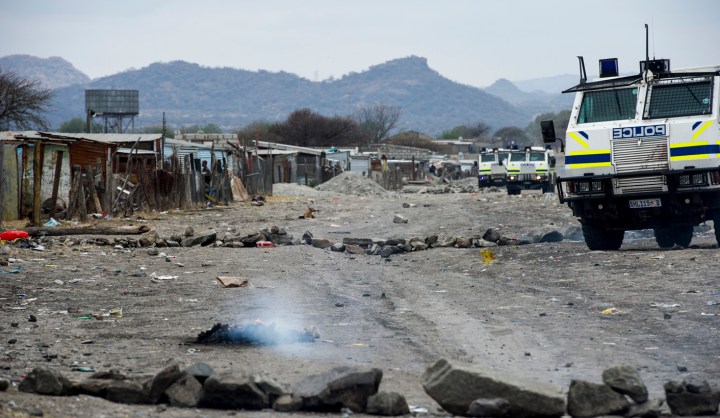
Saturday should be the best day of the week. One gets to sleep in. See friends; do some shopping; have a long, slow coffee. Feel good about life, the universe and, if not everything, at least most things. But not if you live in the settlement of Nkaneng, a cluster of shacks just a stone’s throw from Wonderkop. If you happen to be one of its residents, you spent this Saturday running away from teargas, dodging rubber bullets and swinging between fear and hatred for the police. Or feeling mostly both. By BRANKO BRKIC.
One can think of few, if any, better companions to enter the township limits of Nkaneng than Greg Marinovich, his fearless wife Leonie and the researcher Thapelo Lekgowa, the one who originally unearthed the murder field of Small Koppie while doing a survey with the UJ professor Peter Alexander.
The events of Saturday morning, before we arrived, filled the world of Marikana with heavy, dark clouds. Police raided the miners’ hostel and homes overnight, looking for arms and confiscating several. These were not firearms, mind you, but rather sticks and, at a push, pangas or machetes. As we were approaching, headline news on the radio was that the police also broke up a gathering of 200 or so protesters, using teargas and rubber bullets.
Fearful of the police Nyalas returning, residents erected barricades wherever possible. The already impassable ‘roads’ of Nkaneng were now full of massive rocks; the air was thick with the choking smoke of burnt tyres.
As we got deeper into the settlement, the news arrived that during the earlier morning scuffles, four women had been injured by the rubber bullets and were in the Andrew Saffi hospital, with some being taken to the Job Tabane provincial hospital in Rustenburg. We negotiated our way into the heart of the community, where a little ‘plaza’ was enveloping the community hall; in reality a single-layer corrugated tin shack. As we arrived, the women gathered and talked about what had happened the previous night. Around us, at the ‘plaza’ perimeter, spotters were dispatched to inform about the police Nyalas’ movements.
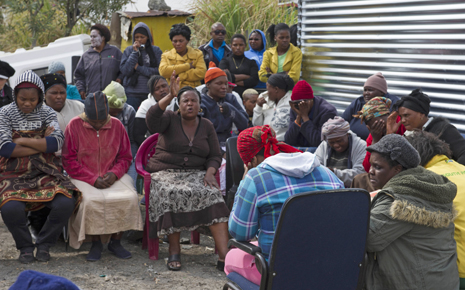
Photo: The women gathered in the community centre to re-live the pain of the previous night. (Daily Maverick)
And women were angry. Beyond angry; incandescent with rage. One after the other, they informed their friends about the night raids, police arrogance, and indifference to their children’s plight. Police were looking for their men, they said, but it didn’t stop them from ordering women on the ground, making rude gestures and laughing at them.
“The children are choking on teargas because it is being shot into our shacks where we live with our children. Where is safety there? Zuma knows nothing about safety. Zuma and Radebe, when they said they will break this thing, did they mean they will be killing us in our shacks?” said one of the women.
“We hear that they will be coming back tonight; what sleep? Where are we going to sleep? How are you going to sleep? It’s all in the hand of God now. Where must we run to now? We have children who go to school – it is impossible to pack our bags and go home at this point; December is far from here. Government announced it and we heard it – ‘kill them’ – [but] this people, even if they are carrying weapons, they are killing no one with them but just protesting. It’s their weapons anyway. They are sending back the police who killed some of them. They ask for their weapons, then they shoot at them when [they are] defenceless.”
As the women were telling their stories, the police surveillance helicopter was flying overhead; repeatedly, menacingly. But then the accusations became even further-reaching, in a way that should chill the blood of every South African who cares for this country: The struggle turned tribal.
(Let us digress here for a second: while Lonmin’s Marikana mine is on Tswana land, the overwhelming majority of the miners protesting are of Pondo [Xhosa] and Sotho origin.)
The women’s talk suddenly switched to blaming President Zuma. Why do you think no Zulu died in the massacre? Because Zuma organised everything. Inkatha warriors marched with their traditional arms just a day before; how come no-one attempted to disarm them, but when their husbands, Xhosas, have their traditional arms, they get shot at and killed?
And then all hell broke lose. The spotters’ sign, unseen by us, was made, and every man started running in one direction, away from the ‘plaza’. Women started praying, with all the air they had in their lungs, their arms up, like it was only the heavens that could help them. Being enveloped by the sound of many women praying loudly was both beautiful and frightening; it was powerful in its powerlessness.
This reporter decided to investigate: the police Nyala entered the maze of the little ditches that served as streets and extricated itself towards the outer limits. But police were not gone forever: after moving about two hundred metres, the Nyala made a U-turn and went straight back towards the community’s heart. Another scattering ensued, with the road in front of the heavily armed vehicle suddenly abandoned.
The Nyala approached the barricade that was set up a mere 20m away from this reporter, then turned away, exposing its right flank to the shacks people fled into.
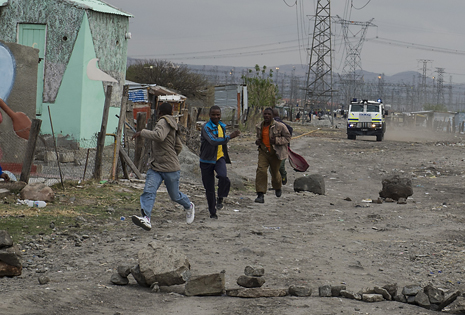
Photo: … And then, the Nyala made a U-turn… (Daily Maverick)
And then they started firing rubber bullets.
Bravely hidden in their armoured car, wearing their bullet-proof vests and sitting behind their portholes, they fired indiscriminately and with no provocation. As this reporter feverishly photographed, they stood there, untouchable and inscrutable, all-powerful, if only for a moment. And then the Nyala made another U-turn and disappeared into the maze of little lanes.
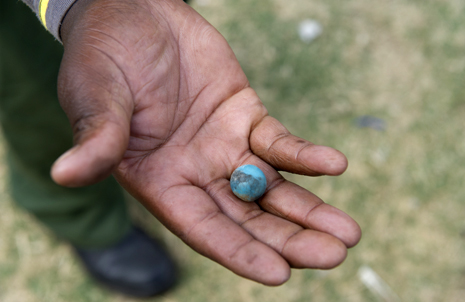
Photo: The rubber bullets were fired indiscriminately. (Daily Maverick)

Photo: Bravely hidden in their armoured car, wearing their bullet-proof vests and sitting behind their portholes, they fired indiscriminately and with no provocation. (Greg Marinovich)
As people started emerging from their shacks, their faces were tensed with anger. They showed the rubber bullets that, just moments before, had pierced their shacks. There were plenty of children around. The police were firing rubber bullets without concern for whether they would hit a child, a woman, or anyone else. The heavy instrument of state repression was being used against the underclass; there is no police spin or PR that could spin its way out of that simple fact. This reporter saw it, all of it.
As our time, and welcome, in the heart of Nkaneng community eventually came to the end, we moved back to the Wonderkop and Small Koppie, for more work.
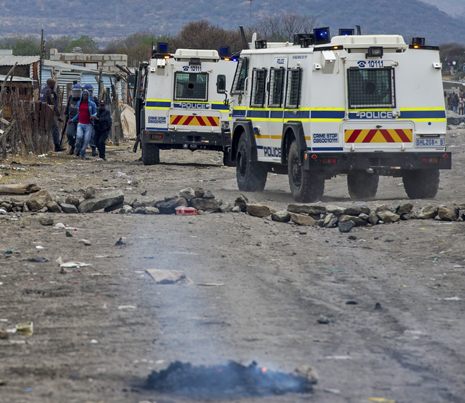
Photo: The police harassment was continuous. (Greg Marinovich)
From the direction of the settlement, the police loudspeakers were ordering people off the streets, and telling women that they wanted their men.
But this reporter couldn’t stop thinking about the panicky heavy-handedness that the state displayed on Saturday.
Who can order people off the streets? Who can violate people’s homes at will and without a court order?
And even if they had the legal right to do so, which is doubtful at this stage, no court order would ever allow for this kind of intimidation and humiliation during the arrest, search or seizure.
There was a national outcry two weeks ago when the NPA used Apartheid’s ‘common purpose’ law to charge 270 miners with 34 counts of murder each. And yet, on Saturday in Nkaneng, we saw an entire community treated as one criminal, where being a child of five, a girl of 13, a woman of 65, or a man that had nothing to do with the strike, was not enough to keep you safe from harassment and injury. Common purpose indeed.
After the police shot 112 miners on 16 August, killing 34 of them, the state of South Africa could have, should have, shown empathy and care for the people that everyone forgot for such a long time. Instead, they chose to let NGOs deliver food and care for the hungry and sick, while they opted for the delivery of teargas, rubber bullets and intimidation.
Make no mistake: what is happening today just a stone’s throw away from the blood-soaked field of Marikana, is nothing but a state repression. The government of South Africa decided that it was better for it to be feared than loved. What they achieved is something different: They are now hated. And a government that is hated by its own people has no credibility.
As we travelled back towards our comfortable lives, this reporter remembered a few words by Greg Marinovich:
“Just like the Apartheid, man. Just like the Apartheid.” DM
Main photo: On Saturday morning, police shot at, teargassed and also arrested some 14 residents. Many of the injured residents were women. (Greg Marinovich)

















 Become an Insider
Become an Insider